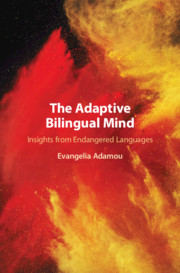Book contents
- The Adaptive Bilingual Mind
- The Adaptive Bilingual Mind
- Copyright page
- Contents
- Figures
- Tables
- Preface
- Acknowledgements
- Abbreviations
- Introduction and Methods
- Part I Do Bilinguals Maintain Language-Specific Conceptualizations?
- 4 State of the Art
- 5 Space
- 6 Time
- Part II Are Bilinguals Confronted with High Cognitive Costs?
- Part III Conclusions
- Glossary
- Appendix Research Participant Consent Form
- References
- Index
5 - Space
from Part I - Do Bilinguals Maintain Language-Specific Conceptualizations?
Published online by Cambridge University Press: 23 April 2021
- The Adaptive Bilingual Mind
- The Adaptive Bilingual Mind
- Copyright page
- Contents
- Figures
- Tables
- Preface
- Acknowledgements
- Abbreviations
- Introduction and Methods
- Part I Do Bilinguals Maintain Language-Specific Conceptualizations?
- 4 State of the Art
- 5 Space
- 6 Time
- Part II Are Bilinguals Confronted with High Cognitive Costs?
- Part III Conclusions
- Glossary
- Appendix Research Participant Consent Form
- References
- Index
Summary
Since Albert Einstein’s special and general theories of relativity in the beginning of the twentieth century, it has become apparent that the way we experience and think of space and time greatly differs from the reality of spacetime: ‘Ours is a relativistic reality’ (Greene, 2004: 10). Taking this approach one step further, the Linguistic Relativity hypothesis holds that the way that we perceive and think of the real world is largely shaped by our language habits. Whorf submits the following idea: ‘We are thus introduced to a new principle of relativity, which holds that all observers are not led by the same physical evidence to the same picture of the universe, unless their linguistic backgrounds are similar, or can in some way be calibrated’ (Whorf, 1940/1956: 214). More specifically, about space, Whorf observed that even though ‘the apprehension of space is given in substantially the same form by experience irrespective of language … the concept of space will vary somewhat with language’ (Whorf, 1941/1956: 158).
- Type
- Chapter
- Information
- The Adaptive Bilingual MindInsights from Endangered Languages, pp. 57 - 75Publisher: Cambridge University PressPrint publication year: 2021

